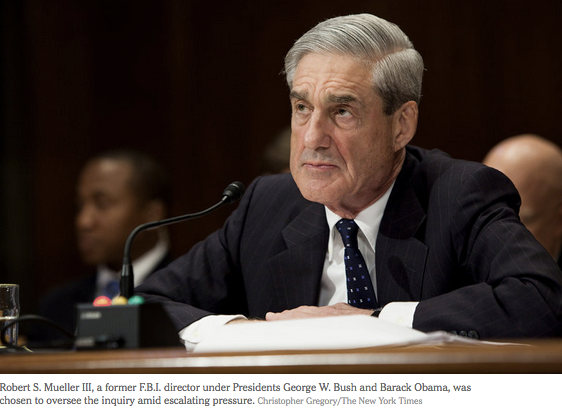WASHINGTON — The Justice Department appointed Robert S. Mueller III, a former F.B.I. director, as special counsel on Wednesday to oversee the investigation into ties between President Trump’s campaign and Russian officials, dramatically raising the legal and political stakes in an affair that has threatened to engulf Mr. Trump’s four-month-old presidency.
The decision by the deputy attorney general, Rod J. Rosenstein, came after a cascade of damaging developments for Mr. Trump in recent days, including his abrupt dismissal of the F.B.I. director, James B. Comey, and the subsequent disclosure that Mr. Trump asked Mr. Comey to drop the investigation of his former national security adviser, Michael T. Flynn.
Mr. Rosenstein had been under escalating pressure from Democrats, and even some Republicans, to appoint a special counsel after he wrote a memo that the White House initially cited as the rationale for Mr. Comey’s dismissal.
The Special Counsel America Needs
Given the “unique circumstances” of the case, Deputy Attorney General Rod Rosenstein said in making the appointment, a special counsel “is necessary in order for the American people to have full confidence in the outcome” of the investigation.
Mr. Rosenstein is absolutely right, and he has done the nation a service in choosing Mr. Mueller, one of the few people with the experience, stature and reputation to see the job through. Mr. Mueller led the F.B.I. for 12 years under Presidents George W. Bush and Barack Obama. In 2004, he and Mr. Comey, then deputy attorney general, threatened to resign if President Bush allowed a domestic-surveillance program to continue without Justice Department approval.
Mr. Rosenstein, who was upset when the White House initially tried to make him the fall guy for Mr. Comey’s dismissal, showed similar independence on Wednesday. He stood up to a president who has repeatedly signaled he wants no investigation whatsoever. In fact, he refrained from even notifying the White House of Mr. Mueller’s appointment until after he had signed the order.
Read full editorial




